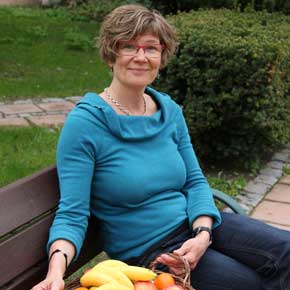Press Release 13 May 2014
How much fruit and vegetables do children and teenagers consume in Sweden? The Swedish National Food Agency is looking for investigative pupils who want to be research assistants for a day. This mass experiment is part of the science festival, Researchers’ Night.
There is very little knowledge about what Swedish children and teenagers eat. This is something that the Swedish National Food Agency (Livsmedelsverket) wants to change by conducting the mass ‘Vegetable Experiment’.
“With the pupils’ help, we can collect valuable information about how much fruit and vegetables children and young people eat during a day, as well as the types that are most commonly consumed,” said Ulla-Kaisa Koivisto Hursti, a researcher at the National Food Agency.
Over one day, participants will record how much fruit and vegetables they eat, both at school and at home. Through the mass experiment, pupils get the opportunity to participate in real research. At the same time, they learn more about the content of food and the significance of meals and nutrients for health, fighting disease and the function of different organs in the body.
Knowledge about eating habits is important to the National Food Agency as it helps them to find out how closely they match nutritional recommendations and to formulate dietary advice specifically adapted to target groups.
The researchers are keen to find out whether there are any age, gender or regional differences in how young people eat. The experiment will also include environmental factors, for example, the pupils will be recording whether the fruit and vegetables are organic or conventionally grown. About a quarter of a Swedish household’s carbon footprint comes from food consumption.
This is the sixth year that a mass experiment, in which pupils help researchers to collect data, has been organised as part of the science festival, Researchers’ Night.
“In previous experiments, pupils have helped scientists develop new knowledge on subjects such as their own classroom environment and their perception of risks. The experiments give scientists a unique opportunity to collaborate directly with schools and collect large amounts of data, while the pupils get to try their hand at research and learn more about what it involves,” said Cissi Askwall, Secretary General of the Swedish non-profit organisation Public & Science (Vetenskap & Allmänhet) that coordinates Researchers’ Night in Sweden.
There is no cost to participate in the mass experiment. All schools in Sweden and pupils of all ages are welcome to participate. The research results will be published in a report in early 2015.
The EU Commission has declared the last Friday in September each year European Researchers’ Night across the whole of Europe. In Sweden, the event is called ForskarFredag and is celebrated in thirty different locations. On Friday 26 September, children and adults are invited to try their hand at science, experiment, investigate and meet scientists from Luleå in the north to Lund in the south.
Researchers’ Night and the mass experiment are coordinated by Vetenskap & Allmänhet (Public & Science), with support from the European Commission, the Swedish Research Council and VINNOVA, the Swedish Governmental Agency for Innovation Systems.
For more information contact:
Fredrik Brounéus, Project Manager at Vetenskap & Allmänhet (Public & Science) Science, tel: +46 72-556 34 48, fredrik @ v-a.se
Ulla-Kaisa Koivisto Hursti, researcher at the Swedish National Food Agency (Livsmedelsverket), tel: +46 733-545 373, ulko @ slv.se
Vetenskap & Allmänhet, VA (Public & Science) promotes dialogue and openness between researchers and the public −especially young people. The organisation works to create new forms of dialogue about research. VA is also developing new knowledge on the relationship between research and society through surveys and studies. Its members consist of some 80 organisations, authorities, companies and associations. In addition, it has a number of individual members. For more information visit www.v-a.se/in-english

